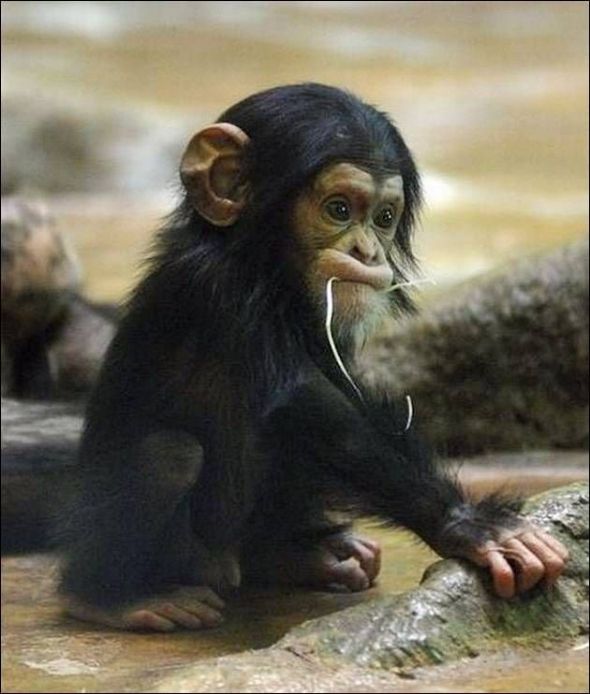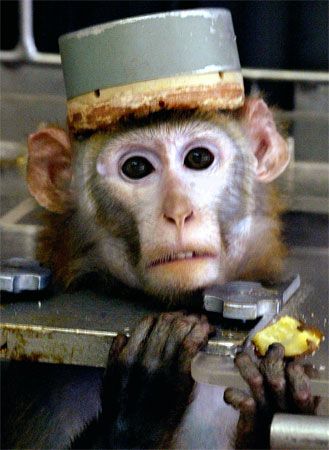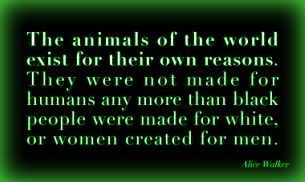Human And Animal Rights
How do we know what is right? How should other people be treated? There are debates going on in society about many issues, so obviously there is no easy answer to these questions, even where humans are concerned.
In the case of humans, the United Nations Declaration of Human Rights sets out a list of rights that people should have. These include:
*Everyone has the right to life, liberty and security of person.
*No one shall be held in slavery or servitude.
*No one shall be subjected to torture or to cruel, inhuman or degrading treatment or punishment.
According to the United Nations, a person may not be killed, exploited, cruelly treated, intimidated, or imprisoned for no good reason. Put another way, people should be able to live in peace, according to their own needs and preferences.
Who should have these rights?
Do they apply to people of all races? Children? People who are brain damaged or senile? The Declaration makes it clear that basic rights apply to everyone. To make a slave of someone who is intellectually handicapped or of a different race is no more justifiable than to make a slave of anyone else.
The reason why these rights apply to everyone is simple: regardless of our differences, we all experience a life with its mosaic of thoughts and feelings. This applies equally to the princess and the hobo, the brain surgeon and the "dunce". Our value as individuals arises from this capacity to experience life, not because of any intelligence or usefulness to others. Every person has an inherent value, and deserves to be treated with respect in order to make the most of their unique life experience.
The idea of human rights and inherent value has not always been accepted.
In previous centuries Africans were captured and taken as slaves to American plantations. They were cruelly treated, and many died or were killed. Families were split apart forever. Slaves were considered to be savages without souls. They were treated as objects to be exploited, with no regard for their feelings or their lives.
During the Second World War, Nazis not only killed millions of Jews in concentration camps, they also carried out scientific experiments on them. Jews were considered to be undesirable and not real humans deserving of respect.
In each case the perpetrators of these atrocities singled out groups that were in some way different, and claimed that they were inferior. This inferiority supposedly justified the appalling treatment. Both slave traders and Nazis denied the inherent value of their victims, and instead treated them as objects to be exploited or destroyed at will.
What about animals?
Do they have inherent value?
Do they, like humans, deserve respect?
Do they have inherent value?
Do they, like humans, deserve respect?
There is no doubt that animals experience a life, certainly the vertebrates (animals with backbones), and possibly others. Like us, animals can feel pain and fear, but also excitement and satisfaction. Close contact with animals shows that they look forward to some events, and can clearly get a lot of enjoyment from their lives, be it from basking in the sun, exercising, eating favourite food, or interacting with others, as in playing and mutual grooming.
Certainly animals don't have the same abilities as humans. They can't talk, write books or drive cars, but neither can some humans. Do we say that humans who lack these abilities have no value and no rights? Certainly not, because those people still experience a life which can be filled with positive or negative events.
We don't ask how intelligent a person is before we decide whether to eat them or experiment on them. Regardless of intelligence, their life still has value to them!
Exactly the same is true of animals!
In spite of species differences, we have in common the capacity for experience. As philosopher Tom Regan has said in his argument for animal rights:
”We are each of us the experiencing subject of a life, a conscious creature having an individual welfare that has importance to us whatever our usefulness to others. We want and prefer things, believe and feel things, recall and expect things. And all these dimensions of our life, including our pleasure and pain, our enjoyment and suffering, our satisfaction and frustration, our continued existence or our untimely death -- all make a difference to the quality of our life as lived, as experienced, by us as individuals. As the same is true of those animals that concern us (the ones that are eaten and trapped, for example), they too must be viewed as the experiencing subjects of a life, with inherent value of their own."
If the inherent value of humans means that they have the right to be treated with respect, then the same applies to animals.
The points made earlier about human rights can be rephrased:
Animals may not be killed, exploited, cruelly treated, intimidated, or imprisoned for no good reason. Animals should be able to live in peace, according to their own needs and preferences.
Animal rights and experimentation
If each individual has inherent value, is it justifiable to harm one individual for the benefit of others? Is the evil of violating the rights of that individual outweighed by the good result that may come of it?
The Nazis experimented on Jews, and were condemned for it in the Nuremberg war crime trials. It is accepted that individual humans may not be forced to take part in harmful experiments, even though there is no doubt that better medical knowledge would be gained in this way than by experimenting on other species. This end (better medical knowledge) does not justify the wrong that is done to the individuals that are experimented on. The same principle applies to all people, including those that are brain damaged, senile or mentally ill. They have value in themselves, and are not objects to be used for the benefit of others.
The same is also true of animals. Using them as objects in experiments ignores their right to be treated with respect. To quote Tom Regan again:
”Lab animals are not our tasters; we are not their kings. Because these animals are treated routinely, systematically as if their value were reducible to their usefulness to others, they are routinely, systematically treated with a lack of respect, and thus their rights routinely, systematically violated. This is just as true when they are used in trivial, duplicative, unnecessary or unwise research as it is when they are used in studies that hold out real promise of human benefits. We can't justify harming or killing a human being just for these sorts of reason. Neither can we do so even in the case of so lowly a creature as a laboratory rat."
Humans like to think of themselves as the most important and valuable species on earth. Mostly they don't give reasons for this belief, but if pressed might say humans are more intelligent than other animals. We have already seen that intelligence is not what guides our behaviour towards other humans - we don't experiment on the "mentally sub-normal". Philosopher Peter Singer points out the contradiction in many people's thinking:
”Why do we lock up chimpanzees in appalling primate research centers and use them in experiments that range from the uncomfortable to the agonizing and lethal, yet would never think of doing the same to a "retarded" human being at a much lower mental level? The only possible answer is that the chimpanzee, no matter how bright, is not human, while the "retarded" human, no matter how dull, is. This is speciesism pure and simple, and it is as indefensible as the most blatant racism.
The way animals are exploited and treated without respect is a prejudice like racism. It is saying that some individuals don't count simply because they are of a different race (racism), or a different species (speciesism).
Prejudices have changed slowly over the centuries - it is no longer acceptable to say that people of other races, women, or the handicapped don't count. It is also not acceptable to say that animals don't count. As Peter Singer has said:
"Any being capable of feeling anything, whether pain or pleasure or any kind of positive or negative state of consciousness, must therefore count."
But if it is wrong to violate the rights of individuals by harming them in experiments, how can the suffering caused by diseases be lessened? Here Peter Singer has said:
"If in our present situation we find ourselves faced with the dilemma of inflicting harm on an animal in an experiment, or allowing harm from a disease to go unchecked, the best possible solution is to find a way around such a dilemma."
Medical research would not stop without animals. There is already valuable research going on that doesn't cause harm in the process. For examples see Research without animals and the work of the Dr Hadwen Trust for Humane Research.
This is the way around the ethical dilemma, and the way of the future.
References:
1.Tom Regan, “The case for animal rights”, in Peter Singer (ed), In Defence of Animals , Basil Blackwell, Oxford, 1985
2.Peter Singer, “Ethics and the new animal liberation movement”, in Peter Singer (ed), In Defence of Animals , Basil Blackwell, Oxford, 1985
Source: Animal Liberation
In addition: See the Peta website: Alternatives to Animal Testing
Please sign and share the Animal Bill Of Rights, thank you!
♥
Animal Rights Links
Vegan Recipe & Cooking Links
Herbal & Garden Links
Martha Magenta's Poetry Links
General Topic Links
Vegan Recipe & Cooking Links
Herbal & Garden Links
Martha Magenta's Poetry Links
General Topic Links




No comments:
Post a Comment